OCCAM/NCI Supported International Projects and Activities on Chinese Medicine and Cancer
Conferences
US - China International Collaborative Studies on Chinese Medicine
In April 2006, the Office of Cancer Complementary and Alternative Medicine (OCCAM) of NCI hosted a conference titled 'Traditional Chinese Medicine and Cancer Research: Fostering Collaborations; Advancing the Science' at the National Institutes of Health (NIH), with almost 200 scientists and physicians attended including more than 40 from China. This conference served as an incubator for establishing new collaborative relationships between Chinese medicine and Western medicine practitioners and researchers for cancer prevention, treatment and palliation. Since then, promoted by this conference, many new international collaborations have been established. Examples of these collaborative studies include studies on:
- Chinese anticancer drugs, specifically the Sheng Qi formula and Fufang Kushen Injection between the Laboratory of Molecular Immunoregulation of CCR/NCI and Cancer Institute, China Academy of Chinese Medical Sciences (CACMS)
- Effects of the natural product berberine, derived from a Chinese herb, on inhibiting colon tumorigenesis
- Effects of resveratrol on preventing tumorigenesis in mouse model between the Laboratory of Cancer Prevention of CCR/NCI and Cancer Institute, CACMS
- Screening compounds and extracts from Chinese medicinal herbs on their anticancer activity between Natural Products Branch of DCTD/NCI and labs from institutes of China Academy of Sciences and China Academy of Medical Sciences
- A standardized version of a four-herb Chinese medicine, PHY906. These studies explored mechanisms of action for the anticancer activity and symptom management and were performed between the Infectious Disease and Immunogenetics Section of Clinical Center of NIH and Department of Pharmacology, Yale University
- Chemoprevention of lung squamous cell carcinoma in mice by a mixture of Chinese medicinal herbs, known as Antitumor B (ATB). These studies were performed between the Department of Surgery of Washington University School of Medicine and Cancer Institute of China Academy of Medical Science
- Chemoprevention studies of the ginsenoside, compound K, American ginseng, Salvia miltiorrhiza (Dan Shen), and Oplopanax horridus. These studies were performed between The Tang Center of University of Chicago and China Pharmacology University
- The safety and pharmacokinetics of an Astragalus-based herbal formula, known as Jinfukang on non-small cell lung cancer patients between Memorial Sloan Kettering Cancer Center and Shanghai University of Traditional Chinese Medicine
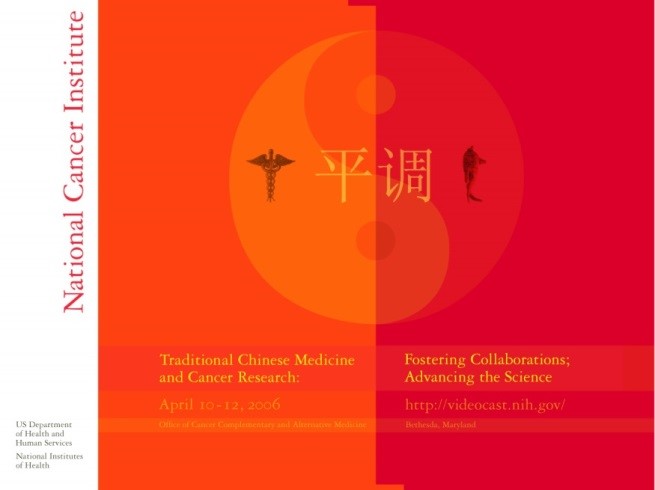
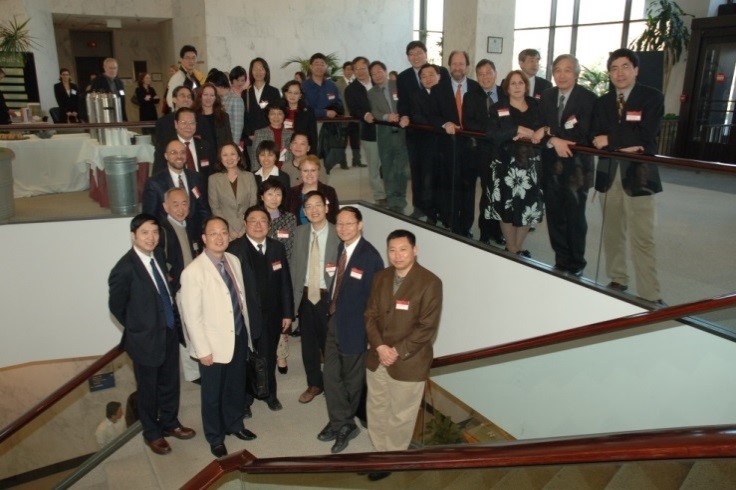
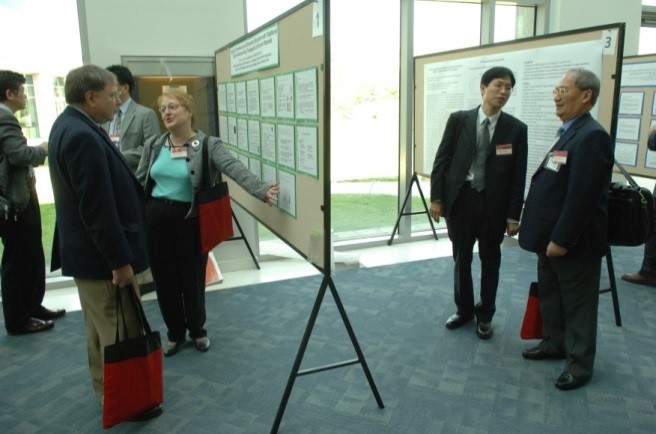
Consecutively in 2011 and 2013, OCCAM/NCI and Cancer Institute, CACMS cohosted two international conferences in Beijing, China on Traditional Chinese Medicine (TCM) and cancer research. These meetings continued to explore the intersection of TCM and Western oncology, and further established the potential value of more dialogs between scientists and healthcare practitioners from different countries (USA, China, Korea, Australia, Singapore) and backgrounds; the potential synergies that can come from joining together complementary resources; and the potential for international scientific communications and collaborations to aid in the modernization of TCM for oncology applications.
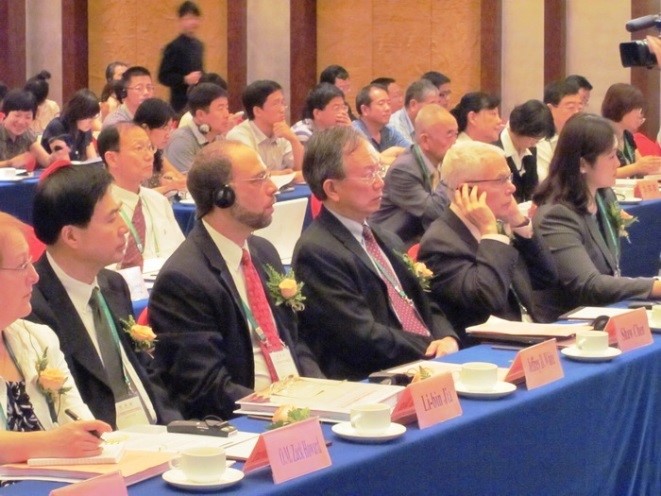
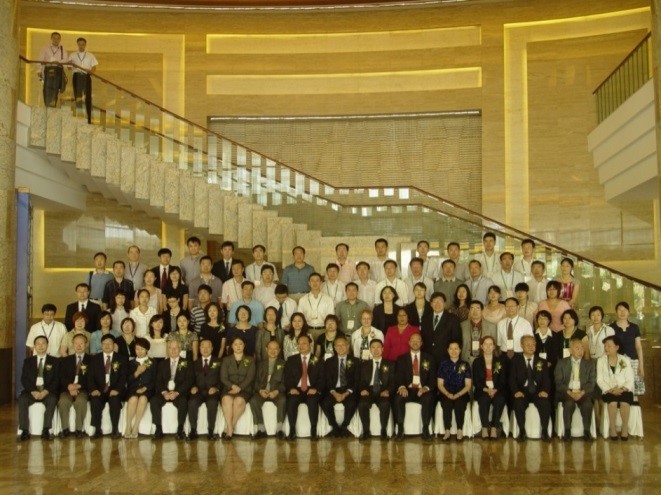
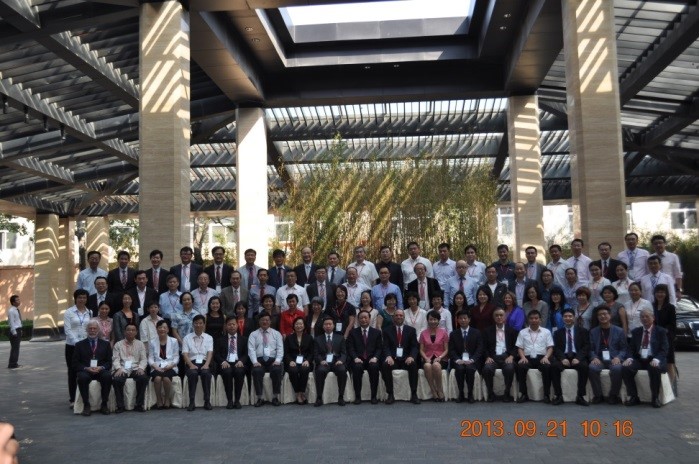
Acupuncture for Cancer Symptom Management, June 16-17, 2016
(https://cam.cancer.gov/news_and_events/conferences.htm)
Drs. Farah Zia (Chair) and Oluwadamilola Olaku (Co-Chair) of OCCAM conceptualized and organized this seminal meeting convened on the NIH Campus, Natcher Auditorium, June 16-17, 2016. It was built on the foundation laid by the 1997 NIH Consensus Development Conference and the 2007 Society for Acupuncture Research (SAR) International Conference. Invited speakers included 19 scholars from the United States, Europe, and China, with expertise in acupuncture and cancer research. Topics included NCI's portfolio on acupuncture, patient needs, safety issues, clinical trial methodology and statistical considerations, cost-effectiveness and reimbursement issues, current state of the science of local and central mechanisms, and gaps in basic and clinical research. The conference affirmed the potential use of acupuncture in the management of cancer symptoms, in which the experts urged further integration into oncology care, and called for establishing a dedicated field for “oncology acupuncture.” A white paper summary will be published in an upcoming special edition monograph of the Journal of the National Cancer Institute (JNCI).
Intramural Research
NCI Cooperative Research and Development Agreement (CRADA) 02827
With continued support from OCCAM/NCI, the international collaborations between NCI and Cancer Institute of CACMS have reached a new level. On December 19th, 2012, a Cooperative Research and Development Agreement (CRADA) was signed by Dr. Douglas R. Lowy, Director of NCI and Dr. Hongsheng Lin, Director of Cancer Institute of CACMS. The CRADA’s goal is to support collaborative research on the TCM drug Fufang Kushen Injection (FKI), including in vitro cancer cells and in vivo animal mechanistic studies. The parties are studying the ability of FKI to modulate cancer-induced temperature sensitivity and pain, tumor growth and metastases, immune-function, and cross-talk between neuronal and immune systems in certain murine (mouse) tumor models. The CRADA states that the Cancer Institute of CACMS would provide fund to NCI (specifically the Laboratory of Molecular Immunoregulation at CCR/NCI) to help support the study of FKI. Furthermore, Cancer Institute of CACMS would also send fund for visiting Cancer Institute fellows working on the FKI collaborative project at NCI. The CRADA states that Cancer Institute of CACMS will continue supporting this collaboration for 5 years.
Research Projects
OCCAM/NCI supported international collaboration of Chinese Medicine compound drug study on prostate cancer stem cells
OCCAM/NCI supported cancer stem cell (CSC) research at the Center for Cancer Research (CCR) of NCI under the senior investigator Dr. William Farrar. New findings from this research shows that compounds from natural products, such as parthenolide (PTL), gossypol (GSP) and Methylselenol (MSA), could target and inhibit the growth of a putative prostate cancer stem cell (PCSC) population. In 2011, with the support from OCCAM/NCI, a new international collaboration study was established between Dr. Farrar’s group and Beijing Guanganmen’ Hospital using compounds isolated from Chinese medicinal herbs to target human prostate cancer cells and PCSC.
Dr. Farrar’s group and visiting fellow Dr. Ying Zhang from Beijing Guanganmen Hospital studied a TCM compound drug, Cryptotanshinone (CT), on human prostate cancer cells and prostate CSC. Their completed collaborative study has resulted in several new findings:
- Cryptotanshinone (CT) — a traditional Chinese medicine herbal compound can regulate the behaviors of both total cancer cells and prostate tumor initiating cells (TICs).
- CT can target cellular proliferation, cell cycle status, migration, viability, colony formation and sphere formation.
- CT can down-regulate stemness genes, such as Nanog, Oct4, Sox2, b-catenin, CXCR4 in TICs.
- CT can target the LNCaP CD24+ CD44+ cell population that is representative of prostate TICs.
A research paper of this study entitled Cryptotanshinone targets tumor-initiating cells through down-regulation of stemness genes expression has been published on Oncology Letters, 2016.
Related Articles:
Zhang Y, Cabarcas SM, Zheng J, Sun L, Mathews LA, Zhang X, Lin HS and Farrar WL. Cryptotanshinone targets tumor-initiating cells through down-regulation of stemness genes expression. Oncology Letters. 2016, 11:3803-3812.
OCCAM/NCI supported international collaborative research on traditional Chinese medicine SQF and FKI
As a follow-up to OCCAM’s “Traditional Chinese Medicine and Cancer Research: Fostering Collaborations; Advancing the Science” conference in April 2006, OCCAM and Beijing Guanganmen Hospital established an international collaboration to study TCM herbal medicines. With support from OCCAM/NCI, two TCM anticancer herbal medicines clinically used in China were studied in the NCI intramural research program by Drs. Joost Oppenheimer and Zack Howard at the Laboratory of Molecular Immunoregulation, Center for Cancer Research (CCR). Visiting fellows from Beijing Guanganmen Hospital work in the lab for the joint studies. One of the TCM medicines studied was Sheng Qi Formula (SQF). SQF is used clinically at Beijing Guanganmen Hospital for reducing cancer patients’ chemotherapy side effects and enhancing the efficacy of conventional cancer therapy. SQF contains Astragalus mongholicus Bge, and Panax notoginseng. The second TCM medicine studied called Fufang Kushen Injection (FKI), which contains the extracts from Sophora flavescens and Rhizoma Smilacis Glabrae. Based upon early studies and clinical applications in China, FKI has been found to show anti-cancer activity and pain relief efficacy. It is widely used clinically for cancer patients in China.
Project progress and findings on SQF
The collaborative studies have shown that SQF can slow 4T1 tumor growth and prolong survival time when given orally to mice alone or combined with chemotherapy. One mechanism of action of SQF is the induction of apoptosis through the mitochondrial pathway. Dr. Zack Howard at CCR/NCI and collaborator fellows — Drs. Jie Li and Huiting Fan from China have made the following findings:
- SQF delivered at 1 X concentration in the drinking water of Balb/c mice bearing 4T1 tumors results in
- Reduced tumor growth
- Reduced numbers of tumor-induced myeloid derived suppressor cells (MDSC)
- Reduced functionality of the remaining MDSC
- Reduced levels of IL-1, G-CSF in the serum of SQF treated tumor bearing mice
- Combination therapy with SQF and Taxol or SQF and Cyclophosphamide resulted in additive reduction in tumor growth and mixed effects on myeloid derived suppressor cells (MDSC).
- Combination therapy with SQF and Gemcitabine resulted in complete blockade of 4T1 tumor growth in 70% of the treated animals.
- A liquid chromatography/mass spectrometry method was developed to quantify saponins in SQF. Rg1, Re, Rb1, Rd and AsII have been chosen as fingerprint chemicals because of their degree of separation in LC/MS.
- Retrospective studies of the chemical fingerprints and tumor effects have identified a functional chemical fingerprint.
- An in vitro bioassay used prior to formulation of SQF has been recently been developed.
- In vitro studies of Rg1, Re, Rb1, Rd and AsII alone and in-combination demonstrated that the Sapoins are not the only functional components of SQF.
- In vitro studies of SQF showed a direct apoptotic effect on 4T1 tumor cells.
- In vivo metabolic studies of Balb/c naïve and tumor bearing mice treated with SQF showed that SQF has a profound effect of glycolysis and fatty acid metabolism.
Related References:
- Li, J. and Howard Z. Inhibitory Effect of Sheng Qi Formula (SQF) on Gr1+ CD11b+ Myeloid Immunosuppressive Cells in the 4T1 Murine Mammary Cancer Model (Abstract), 8th Annual CCR-FRI colloquium, On March 3rd to March 5th, 2008, Ocean City, MD, USA
- Li J. and Howard Z. Inhibitory Effect of herbal medicine Sheng Qi Formula (SQF) on Gr1+ CD11b+ Myeloid Immunosuppressive Cells in the 4T1 Murine Mammary Cancer Model (Abstract), 2008 AACR Annual Meeting, On April 12 to 16, San Diego, CA, USA
Project progress and findings on FKI:
FKI is a mixture of TCM extracted from the roots of two herbs — Sophora flavescens and Heterosmilacis Japonica. FKI is used alone or combined with conventional chemotherapy to treat lung and other cancer patients in China improving anticancer efficacy and reducing the side effects of chemotherapy. In order to fully explore the effects of FKI, and a more complete mechanismof FKI action, and optimal dosing in combination with chemotherapy, Dr. Zack Howard of CCR/NCI and Dr. Zhizheng Zhao, visiting fellow from Cancer Institute of CACMS began a systematic study on FKI. They had confirmed that FKI reduces tumor growth and tumor-induced hyperalgesia in a murine sarcoma model. In addition, they began to define an optimized FKI dosing schedule in the murine sarcoma model. To better utilize FKI and target responsive tumors, they were actively investigating the mechanism of action of FKI for its anti-cancer effect.
The study results showed that FKI not only decreased the size of the tumor, but also decreased hyperalgesia induced by sarcoma as well as TRPV1 and ERK phosphorylation.
The highlights of the FKI study are:
- In vitro assays have demonstrated FKI has a selective in vitro cyto-toxic effect for sarcoma cell lines.
- Studies’ results suggest that FKI at 25 mg/kg reduces tumor-induced temperature sensitivity; FKI at 50 mg/kg reduces tumor-induced temperature sensitivity and sarcoma growth.
- FKI could reduce not only tumor-induced temperature sensitivity but also growth of the implanted sarcoma tumor that grew around the sciatic nerve causing the tumor-induced pain.
- FKI decreased hyperalgesia induced by sarcoma as well as TRPV1 and ERK phosphorylation.
- In an animal model, it has been confirmed that twice a day dosing makes FKI more effective than single dosing. In vitro study also showed that FKI’s anticancer activity might be due to inhibition of Erk phosphorylation.
In July 2011, Dr. Zack Howard of CCR/NCI and Dr. Libin Jia of OCCAM/NCI visited Zhendong Group, the pharmaceutical manufactures of FKI, in Shanxi province, China to better understand how to grow and collect the quality raw materials of herbs used for FKI. Dr. Howard gave a presentation on her study of FKI and Dr. Jia introduced OCCAM's international cancer complementary and alternative (CAM) studies, including the FKI collaboration study with the Cancer Institute, CACMS.
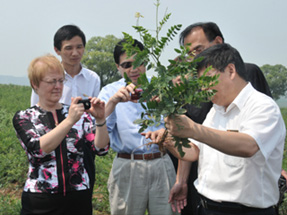
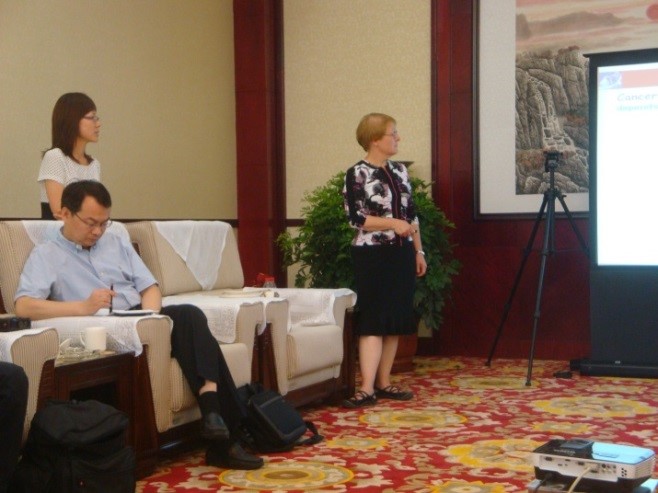
Related Articles:
Zhao Z, Fan H, Higgins T, Qi, J, Haines, D, Trivett, A, Oppenheim, JJ, Wei, H, Li, J, et al. Fufang Kushen injection inhibits sarcoma growth and tumor-induced hyperalgesia via TRPV1 signaling pathways. Cancer Letters. 2014, 355: 232-241.
OCCAM/NCI supported international collaboration on Traditional Chinese Medicine cancer prevention study
With the support form OCCAM/NCI, in March 2012, Dr. Weidong Li from Beijing Guanganmen Hospital began to work with Drs. Nancy Colburn and Mathew Young at the Gene Regulation Section in the Laboratory of Cancer Prevention/CCR at NCI. Their study aims were to study the effects of TCM for colon cancer prevention using colon cancer cell lines and animal in vivo models to determine the effects of these compounds on cancer incidence, growth inhibition, and metastasis control. Compounds and mixtures from TCM herb have been selected and studied on the molecular level with in vitro experiments and animal model approaches. As of 2012, this study has tested the TCM drugs Kushen Injection, cryptotanshinone, berberine and Xiao Ai Ping on cancer cell lines and animal models. Tissue and fecal samples have been collected for further studies by DNA sequencing and metabolomics. In specific, the berberine study has shown some progress. In summary:
- Three human colorectal cancer cell (CRC) lines (HCT116, SW480, LOVO) were treated with the commonly used TCM compound berberine. A cell proliferation assay was used to evaluate the inhibition effects on cell growth. The results showed that berberine inhibits the growth of all three CRC lines. Research showed that berberine activated AMP-activated protein kinase (AMPK) in a dose-dependent and time-dependent manner. In addition, mammalian target of repamycin (mTOR), a downstream target of AMPK, was down-regulated by berberine in a dose-dependent and time-dependent manner.
- Furthermore, the downstream targets of mTOR - 4EBP1 and p70s6 kinase were also down-regulated by berberine treatment in three colon cancer cell lines.
- In vivo studies demonstrated that berberine treated mice showed a significant reduction of tumor number and tumor size compared to vehicle treated mice.
- It is evident that berberine inhibits colon cancer cell growth and decreases carcinogens azoxymethane initiated-dextran sulfate sodium (AOM/DSS) induced tumor numbers and tumor size. The study data suggest that berberine suppresses colon epithelial proliferation via inhibition of mTOR through the activation of AMPK.
This study demonstrates that berberine might offer a safe and promising candidate for chemoprevention of colon cancer. An abstract titled ‘Berberine suppress the colon cancer proliferation through activating AMPK’ from this study was presented on the AACR 2013 annual meeting in Washington DC in April, 2013 and the results from this study were published on line in Molecular Carcinogenesis, 2014.
Related Articles:
Li W, Hua B, Saud SM, Lin, H, Hou, W, Matter, MS, Jia, L, Colburn, NH. and Young, MR. Berberine regulates AMP-activated protein kinase signaling pathways and inhibits colon tumorigenesis in mice. Mol. Carcinog. 2015, 54:1096-1109 (PMID: 24838344).
Li W, Saud SM, Young MR, Chen G, Hua B. Targeting AMPK for cancer prevention and treatment. Oncotarget. 2015, 6:7365-7378 (PMCID: PMC4480686).
Drs. Weidong Li, Nancy Colburn and Mathew Young and other members of the Laboratory of Cancer Prevention of CCR also jointly studied another herb compound Resveratrol on its inhibition activity to prevent tumorigenesis caused by K-ras activated sporadic colon cancer. The study suggested that resveratrol can prevent the formation and growth of sporadic colorectal cancer in mice by downregulating K-ras expression.
Related Articles:
Saud SM, Li W, Morris NL, Matter, MS, Colburn, NH, Kim, YS. and Young, MR. Resveratrol prevents tumorigenesis in mouse model of Kras activated sporadic colorectal cancer by suppressing oncogenic Kras expression. Carcinogenesis. 2014, 35:2778-2786 (PMCID: PMC4247523).
Similarly, in an in vitro study, Drs. Li, Young, Colburn and Hua, and Mr. Saud determined the effects cryptotanshinone (CPT), an extract from herbal medicine, on colorectal cancer cell proliferation and growth. Their study showed that CPT inhibited the growth and cell viability of multiple colorectal cancer cell lines. CPT inhibited activation of Signal transducer and activator of transcription 3 (Stat3), a transcription factor that mediates expression of many genes known to regulated tumor growth. Their findings suggest that CPT could be used for both prevention and treatment of colorectal cancer by inhibiting activation of Stat3.
Related Articles:
Li W, Saud SM, Young MR, Colburn NH, Hua B. Cryptotanshinone, a Stat3 inhibitor, suppresses colorectal cancer proliferation and growth in vitro. Mol Cell Biochem. 2015, 406: 63-73 (PMID: 25912550).
OCCAM/NCI supported US — China anti-cancer drug compound and herbal extract screening projects
Since 2008, OCCAM/NCI started collecting pure compounds and medicinal herb extracts through international collaborative projects through Memorandum of Understanding (MOU) agreements. Up to 349 pure compounds and 200 extracts have been collected from three institutes in China (Kunming Institute of Botany; Key Laboratory of Chemistry for Natural Products (KLCNP) in Guizhou Province; and Institute of Matera Medica, China Academy of Medical Sciences). 74 pure compounds have been screened (1-dose, e.g. =10-5 Mole) on NCI 60 human cancer cell lines; 14 of them entered to 5-dose (10-3, 10-4, 10-5, 10-6, 10-7 Mole each) screens. More compound screenings on NCI60 human cancer cell lines are under testing.
26 compounds have been screened on 7 cell target assays (GP78, PLK1, NF1, EpCAM, META, SUMO, p38) with certain hits; 152 medicinal herb extracts have been screened on 8 cell target assays (GP78, NF1, EpCAM, MALT1, p38, SUMO, TRAIL and META) with certain hits.
Hit extracts or compounds will be further tested on cell target assays.
Extramural Research
International Center of Traditional Chinese Medicine for Cancer Treatment, China
Following a successful pilot study, the NCI was supporting a cooperative agreement to develop the International Center of Traditional Chinese Medicine for Cancer Treatment (ICTCM) that partners the University of Texas M. D. Anderson Cancer Center (MDACC) with the Cancer Hospital, Fudan University in Shanghai, China (Project number: 3U19CA121503). While NCI supported research in individual topics related to TCM, such as acupuncture, these were the first NCI grants to support the development of an international collaborative partnership to study multiple aspects of TCM. Researchers with the center investigated the benefits of some traditional Chinese medicine (TCM) treatments for cancer patients.
During the 2-year pilot study that began in 2003 and was funded by an NCI grant (R21CA108084), the ICTCM investigated 3 aspects of TCM: 1) herbal and natural treatments that target the disease and related symptoms; 2) acupuncture for some side effects of cancer treatment; and 3) the bio-behavioral effects of qigong and other mind/body interventions. This work was advanced further under a new 4-year cooperative agreement, which was also extended for two additional years. The investigators completed Phase I clinical trials on huachansu (a TCM therapy derived from sterilized toad skin extract), acupuncture to prevent prolonged postoperative ileus, and qigong for women with breast cancer. Phase II clinical trials of huachansu combined with gemcitabine in patients with advanced pancreatic cancer, and acupoint stimulation to prevent chemotherapy-induced nausea and vomiting were finalized and data analyses are ongoing. Another study combining tai chi and qigong was completed and the results have showed that these mind-body techniques could lower distress and lead to improvements of different aspects of quality of life.
The phase I trial of huanchansu for the treatment of patients with advanced hepatocellular carcinoma, non-small cell cancer, and pancreatic cancer was completed. In this trial, huanchansu showed to be well-tolerated and could result in disease stabilization in patient subsets.
A study on bufalin, a component of huachansu, showed that Na+/K+-ATPase α3 might serve as a therapeutic target for bufalin in hepatocellular cancer, and its expression status may help predict sensitivity of HCC cells to bufalin treatment.
ICTCM has shown to be central in building new collaborative studies. Dr. Lorenzo Cohen, PI and his team were able to secure a new grant with Fudan University entitled “Placebo Controlled Trial of Acupuncture to prevent Radiation-induced Xerostomia” (R01CA148707).
Related Articles:
Lu Q, You J, Kavanagh A, Warmoth K, Meng Z, Chen Z, Chandwani KD, Perkins GH, McQuade JL, Raghuram NV, Nagarathna R, Liao Z, Nagendra HR, Chen J, Guo X, Liu L, Arun B, Cohen L. Differences in quality of life between American and Chinese breast cancer survivors. Support Care Cancer. 2016, Apr 6. [Epub Ahead of print].
Shen Y, Liu L, Chiang JS, Meng Z, Garcia MK, Chen Z, Peng H, Bei W, Zhao Q, Spelman AR, Cohen L. Randomized, placebo-controlled trial of K1 acupoint acustimulation to prevent cisplatin-induced or oxaliplatin-induced nausea. Cancer. 2015, Jan 1;121 (1) 84-92.
Chen Z, Meng Z, Mibury K, Bei W, Zhang Y, Thornton B, Liao Z, Wei Q, Chen J, Guo X, Liu L, McQuade J, Kirschbaum C, Cohen L. Qigong Improves quality of life in women undergoing radiotherapy for breast cancer: results of a randomized controlled trial. Cancer 2013, May 1;119(9):1690-1698.
Meng Z, Kay Garcia M, Hu C, Chiang J, Chambers M, Rosenthal DI, Peng H, Wu C, Zhao Q, Zhao G, Liu L, Spelman A, Lynn Palmer J, Wei Q, Cohen L. Sham-controlled, randomized, feasibility trial of acupuncture for prevention of radiation-induced xerostomia among patients with nasopharyngeal carcinoma. Eur J Cancer. 2012, Jul;48(11):1692-1699.
Meng Z, Garcia MK, Hu C, Chiang J, Chambers M, Rosenthal DI, Peng H, Zhang Y, Zhao Q, Zhao G, Liu L, Spelman A, Palmer JL, Wei Q, Cohen L. Randomized controlled trial of acupuncture for prevention of radiation-induced xerostomia among patients with nasopharyngeal carcinoma. Cancer. 2012, Jul 1;118(13):3337-3344.
Li H, Wang P, Gao Y, Zhu X, Liu L, Cohen L, Meng Z, Yang P. Na+/K+-ATPase a3mediates sensitivity of hepatocellular carcinoma cells to bufalin. Oncol Rep. 2011, Mar;25(3):825-830.
Ouyang H, Wang P, Meng Z, Chen Z, Yu E, Jin H, Chang DZ, Liao Z, Cohen L, Liu L. Multimodality treatment of pancreatic cancer with liver metastases using chemotherapy, radiation therapy, and/or Chinese herbal medicine. Pancreas. 2011, Jan;40(1):120-125.
Meng Z, Yang P, Shen Y, Bei W, Zhang Y, Ge Y, Newman RA, Cohen L, Liu L, Thornton B, Chang DZ, Liao Z, Kurzrock R. Pilot study of huachansu in patients with hepatocellular carcinoma, nonsmall-cell lung cancer, or pancreatic cancer. Cancer. 2009, Nov 15;115(22):5309-5318.
Meng ZQ, Garcia MK,Chiang JS, Peng HT, Shi YQ,Fu J, Liu LM, Liao ZX, Zhang Y, Bei WY, Thornton B,Palmer JL, McQuade J, Cohen L. Electro-acupuncture to prevent prolonged postoperative ileus: a randomized clinical trial. World J Gastroenterol. 2010, 16:104-111.
McQuade JL, Meng Z, Chen Z, Wei Q, Zhang Y, Bei W, Palmer JL, Cohen L. Utilization of and Attitudes towards Traditional Chinese Medicine Therapies in a Chinese Cancer Hospital: A Survey of Patients and Physicians. Evid Based Complement Alternat Med. 2012:504507, 2012. e-Pub 10/2012. PMCID: PMC3475319.
Chaoul A, Mibury K, Sood AK, Prinsloo S. and Cohen L. Mind-body practices in cancer care. Current Oncology Reports, 2014, 16(12):417.
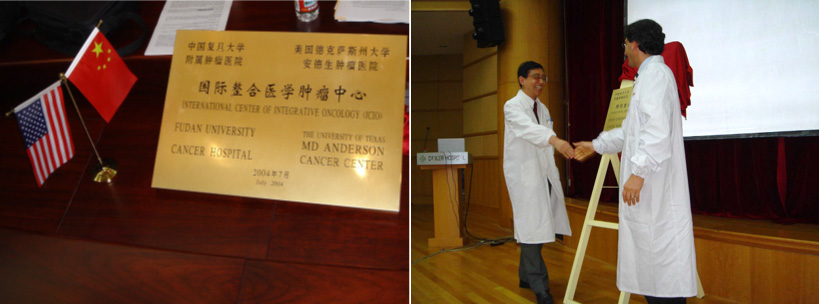
International Center for the Evaluation of East Asian Botanicals for Cancer, China and TCM Medicinal Plant Library at NCI
Investigators at Harvard University in collaboration with the Chinese University of Hong Kong and Hong Kong Baptist University intended to systematically evaluate traditional Chinese medicine (TCM) botanicals for their anti-cancer properties (Project number: 5U19CA128534-04). The objectives were to establish and maintain a library of authenticated TCM botanical extracts for scientific evaluation, to create a high throughput and combinatorial screening core to test the botanicals individually and in combination for their activity in bioassays relating to cancer, and to test extracts and fractions with optimal activity in relevant animal tumor models. The Center consisted of two projects: selective cytotoxicity and angiogenesis, and three cores: administrative, botanical acquisition and authentication, and screening and chemical characterization. The project was started in September 2006 with an expected ended date of July 2011.
The findings of these projects may have translational potential into clinical investigations for cancer treatment. It may establish a future model for systemically evaluating botanicals traditionally used for the treatment and prevention of cancer. In addition, this cooperative agreement afforded the potential for an important public/private partnership to move the field of traditional Chinese herbal medicine significantly forward.
Since 2012, this TCM botanical material collection (over 300 samples) from above project was transferred to the Natural Products Branch, Division of Cancer Treatment and Diagnosis of NCI for continuing study on their anticancer activities using different screening and testing systems, including the NCI 60 human cancer cell lines. Primary data have showed that certain TCM herb extracts can inhibit grow of many cancer cell lines.
Since 2016 at NCI, this TCM botanical material collection becomes a library. It contains over 130 authenticated
medicinal plant species which collectively represent the potential therapeutic contents of the major commonly used
TCM herbal prescriptions. Using conventional lab chemical methods, each herb (with different parts) has been
processed to becoming extracts with either organic solvent or aqueous extraction. A total of 331 samples of 133
TCM plant species are in 96-well and 384-well plate formats and are accessible for drug discovery researchers
worldwide. For the detail information, please check the link:
https://dtp.cancer.gov/organization/npb/tcm_extracts.htm.
Related Articles:
Eisenberg DM, Harris ES, Littlefield BA, Cao S, Craycroft JA, Scholten R, Bayliss P, Fu Y, Wang W, Qiao Y, Zhao Z, Chen H, Liu Y, Kaptchuk T, Hahn WC, Wang X, Roberts T, Shamu CE, Clardy J. Developing a library of authenticated Traditional Chinese Medicinal (TCM) plants for systematic biological evaluation--rationale, methods and preliminary results from a Sino-American collaboration. Fitoterapia. 2011, Jan;82(1):17-33.
Other Activity
International Consortium for Chinese Medicine and Cancer (ICCMC)
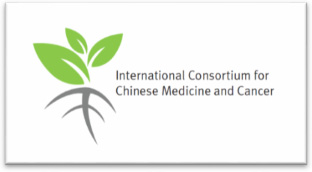
In February 2014, the Cancer Institute, CACMS presented OCCAM/NCI with a proposal for an international consortium with the aims of improving scientific communications and collaborations, improving the quality of research on Chinese medicine for oncology applications, finding potential promising Chinese medicine (CM) drugs and modernizing the research of CM for cancer. NCI’s OCCAM agreed to work with CACMS to explore the feasibility of establishing an international consortium for Chinese medicine and cancer (ICCMC).
On November 3, 2014, in Bethesda, Maryland, OCCAM/NCI held a meeting to examine the potential utility and feasibility of establishing an International Consortium for Chinese Medicine and Cancer. At the meeting, participants from China, the U.S., Canada, Australia, and Korea discussed issues in Chinese medicine and cancer research, treatment and management, including potential mechanisms of action, proof of efficacy, side effects, regulatory issues, and the need for improving the quality of randomized clinical trials of CM treatments and supportive care interventions.
With the support from OCCAM/NCI, Cancer Institute of CACMS and scientists and practitioners from the US, China, Korea, Australia, ICCMC is officially established on October 17, 2015 in Dalian, China. ICCMC will be an international Chinese Medicine and Cancer research platform to promote the basic research and clinical trials as well as symptom management of cancer all over the world.
Some potential initial projects for the consortium:
- To develop exemplary guidelines for CM oncology clinical trials. Define the minimum or essential components for designing and reporting such trials.
- To develop standard treatment protocols and evaluation procedures (like NCCN guidelines)
- To establish a database of Cytochrome P450 enzyme interactions between Chinese medicine herbs and oncology drugs. Much of this data exist; it just needs to be organized.
- Dose-finding and quantification of phytoestrogens from CM herbs
- CM educational exchanges, to find common ground and develop research capacity
- Starting an electronic journal on Chinese Medicine and Cancer
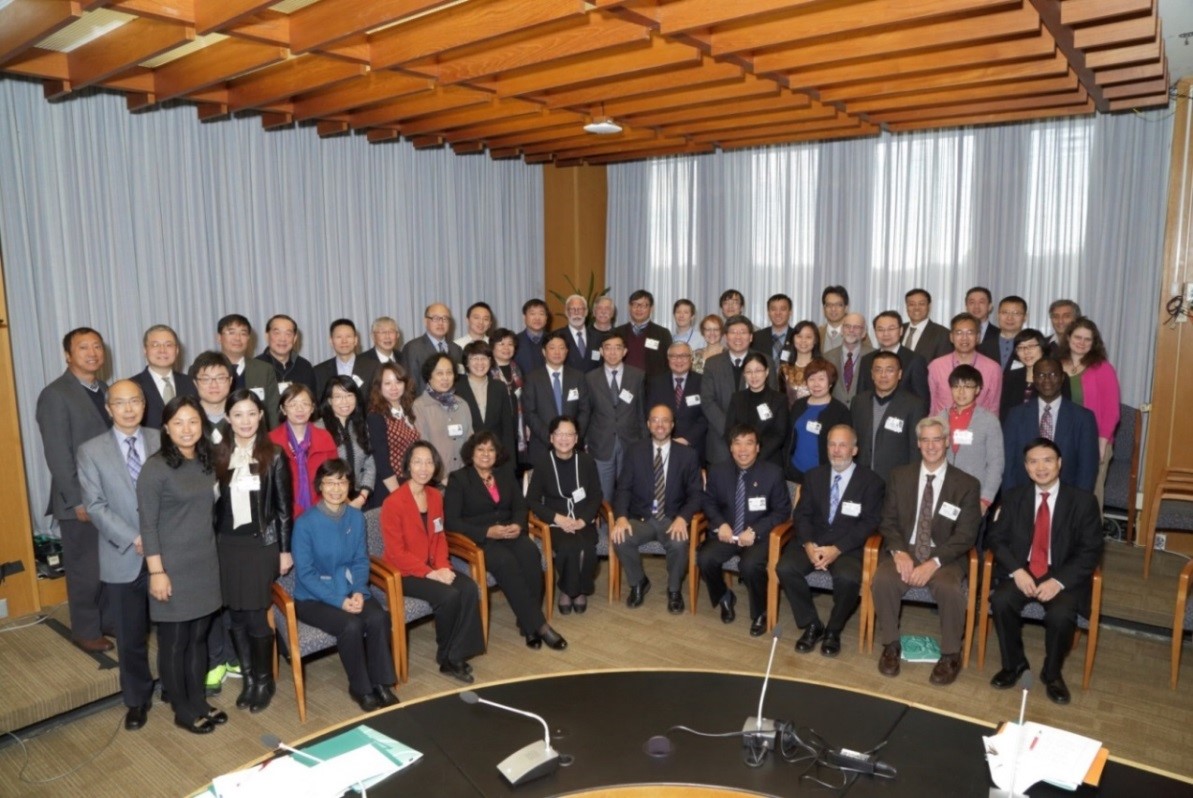
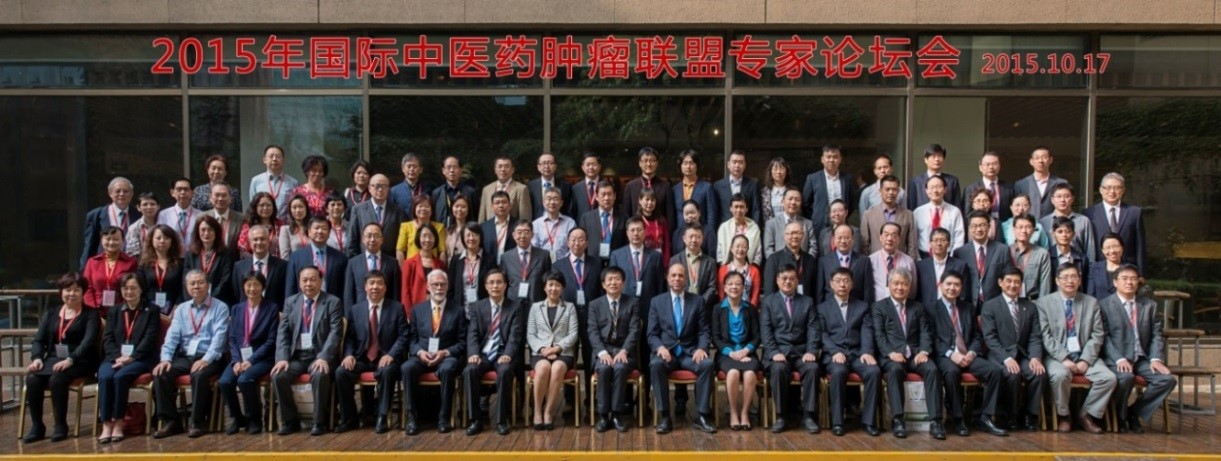
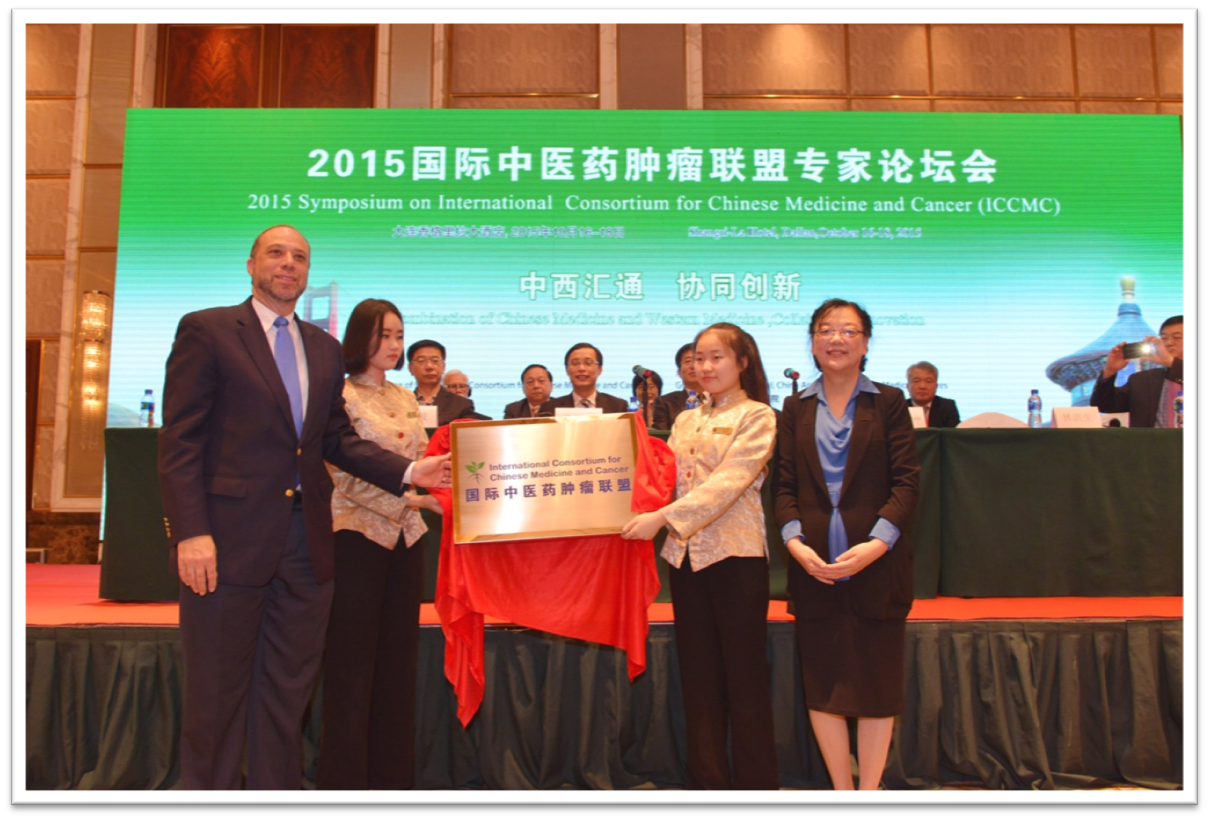
Related Articles:
White JD, Lin HS, Jia, LB, Wu WS, Lam S, Li J, Dou JH, Kumar N, Lin LZ, Lao LX. Proceedings of the Strategy Meeting for the Development of an International Consortium for Chinese Medicine and Cancer. Journal of Global Oncology, September 7, 2016; DOI:10.1200/JGO.2016.006635.
Contact Us
Dr. Libin Jia
Office of Cancer Complementary and Alternative Medicine, DCTD, NCI
libinj@mail.nih.gov
Dr. Dan Xi
Office of Cancer Complementary and Alternative Medicine, DCTD, NCI
xida@mail.nih.gov





